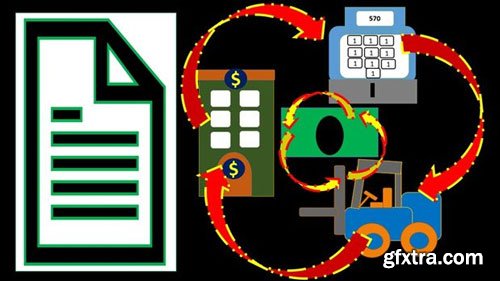
Genre: eLearning | Language: English | Duration: 9.5 hour | Size: 4.18 GB
Use the direct method and indirect method to construct the financial statement explaining how to use accounting workeet
What Will I Learn?
Explain what a statement of cash flows is
List the component parts of a statement of cash flows
Describe how a statement of cash flows is used
List the steps to creating a statement of cash flows
Build a statement of cash flows
Create the cash flows from operating activities section using the indirect method
Create the cash flows from operating activities section using the direct method
Compare and contrast the direct method and indirect method
List and describe non cash inventing and financing activities
Requirements
We should have a basic understanding of financial accounting and debits and credits
Description
Statement of cash flows creation and analysis.
We will introduce the statement of cash flows and discuss its purpose and uses. Understanding how to create a statement of cash flows provides us with a much deeper understanding of accounting and how the financial statements are constructed.
To build a statement of cash flows, we will use concepts of accrual accounting needed to create the balance sheet and income statement. We will apply our understanding of accrual concepts to analyze cash flows, creating a cash flow statement from accrual financial reports.
The course will list and describe the components of the statement of cash flows including cash flows from operating activities, cash flows from investing activities, and cash flows from financing activities.
We will discuss and construct a thought process for determining which category specific cash flows belong to, allowing us to be better at allocating cash flows to either cash flows from operating activities, cash flows from investing activities, or cash flows from financing activities.
The course will list and describe what is required to build a statement of cash flows, as well a strategy for construction that will reduce errors and time spent.
We will compare and contrast the direct method and indirect method of constructing the cash flows from operations section of the statement of cash flows.
The course will discuss how to construct a worksheet to use as a tool to create the statement of cash flows.
We will construct a statement of cash flows using the indirect method in a step by step format.
The course will discuss how to construct a statement of cash flows using the direct method in a step by step format.
We will also discuss how to report non-cash investing and financing activities.
In addition to the instructional videos, this course will include downloadable
• Downloadable PDF Files
• Excel Practice Files
• Multiple Choice Practice Questions
• Short Calculation Practice Questions
• Discussion Questions
The PDF files allow us to download reference information we can use offline and as a guide to help us work through the material.
Excel practice files will be preformatted so that we can focus on the adjusting process and learning some of the basics of Excel, like addition, subtraction, and cell relationships.
Multiple choice example question helps us improve our test-taking skills by reducing the information into the size and format of multiple choice questions and discussing how to approach these questions.
Short calculation questions help us reduce problems that have some calculation down to a short format that could be used in multiple choice questions.
Discussion Question will provide an opportunity to discuss these topics with the instructor and other students, a process many students find very helpful because it allows us to see the topic from different viewpoints.
Who will we be learning from?
You will be learning from somebody who has technical experience in accounting concepts and in accounting software like QuickBooks, as well as experience teaching and putting together curriculum.
You will be learning from somebody who is a:
• CPA – Certified Public Accountant
• CGMA – Chartered Global Management Accountant
• Master of Science in Taxation
• CPS – Certifies Post-Secondary Instructor
• Curriculum Development Export
As a practicing CPA the instructor has worked with many technical accounting issues and helped work through them and discuss them with clients of all levels.
As a CPS and professor, the instructor has taught many accounting classes and worked with many students in the fields of accounting, business, and business applications.
The instructor also has a lot of experience designing courses and learning how students learn best and how to help students achieve their objectives. Experience designing technical courses has also benefit in being able to design a course in a logical fashion and deal with problems related to technical topics and the use of software like QuickBooks Pro.
We will be able to:
· Explain what a statement of cash flows is
· List the component parts of a statement of cash flows
· Describe how a statement of cash flows is used
· List the steps to creating a statement of cash flows
· Build a statement of cash flows
· Create the cash flows from operating activities section using the indirect method
· Create the cash flows from operating activities section using the direct method
· Compare and contrast the direct method and indirect method
· List and describe non-cash inventing and financing activities
Who is the target audience?
Accounting students
Business owner
Anyone who whats to learn accounting
Top Rated News
- Sean Archer
- AwTeaches
- Learn Squared
- PhotoWhoa
- Houdini-Course
- Photigy
- August Dering Photography
- StudioGuti
- Creatoom
- Creature Art Teacher
- Creator Foundry
- Patreon Collections
- Udemy - Turkce
- BigFilms
- Jerry Ghionis
- ACIDBITE
- BigMediumSmall
- Boom Library
- Globe Plants
- Unleashed Education
- The School of Photography
- Visual Education
- LeartesStudios - Cosmos
- All Veer Fancy Collection!
- All OJO Images
- All ZZVe Vectors



